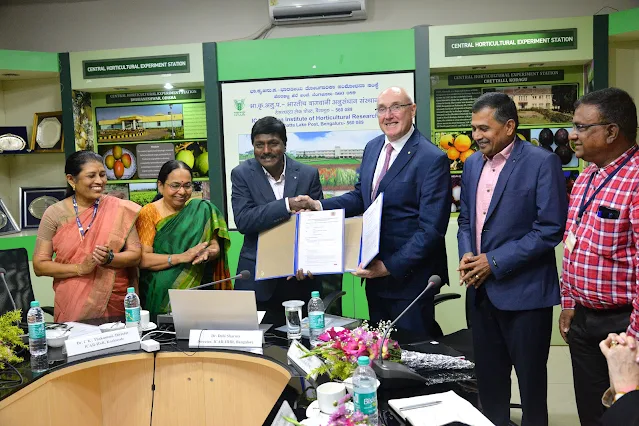
Western Sydney University, the Indian Council for Agricultural Research (ICAR), the Indian Institute of Horticultural Research (IIHR) Bangalore and the Indian Institute for Spices Research (IISR) Calicut, have partnered to launch a Centre in High Tech Protected Cropping Systems to address the impact of the changing climate on crop production.
The Centre will investigate hi-tech aeroponic crop production, crop health monitoring technologies with advanced sensors and cameras and ways to standardise pollination as part of a pilot, with a focus on innovation in aeroponics for high value crops such as microgreens, berries, cutflowers and spices under different lighting and nutrient conditions.
“This is an important pilot for finding cost effective farming that is not climate dependent,” the Deputy Director General of ICAR, A K Singh said. “Production using automated glass house technology is too expensive for the large-scale adoption in India. Working with Western Sydney University and other partners, we have an opportunity to bring together world class researchers from Australia and India to standardise production systems for high value crops like berries, greens, cut flowers and spices,” he said.
 |
| Officials from ICAR, IIHR, IISR and Western Sydney University launch a Centre in High Tech Protected Cropping Systems |
“The collaboration builds on the very productive partnership between the University and the Indian Council for Agricultural Research,” said Western Sydney University Vice-Chancellor and President, Professor Barney Glover AO. “Through cutting edge research, the Centre will explore new, sustainable approaches to production to enhance food security and farming livelihood,” said Professor Glover.
“This partnership in vegetables, berries and cut flowers at the IIHR and in spices at the IISR, plays a critical role in developing efficient, low-cost vertical growing systems for large scale adoption - sustainable farming technologies for the future,” said Dr Debi Sharma, Director, IIHR.
Dr Thankamony, Director IISR said, “Vertical farming can ensure high productivity in spaces per unit area, which means 50-60 per cent more harvest per unit area. However, these resources can only be effectively leveraged when adapted to Indian conditions, requiring a targeted research and development program.”
The Centre in High Tech Protected Cropping Systems will address increasing the farming community’s produce and thereby their income. The research programs will be managed by Dr Debi Sharma, Director, IIHR, Dr Thankamoni, Director, IISR and Dr Nisha Rakhesh, Senior Advisor (Research Strategy), Western Sydney University.
Western Sydney University was recently ranked number one in the world for its social, ecological and economic impact in the Times Higher Education (THE) University Impact Rankings.
As part of its global mission, it is committed to collaborating with industry, education and non-government partners to tackle society’s grand challenges and support a more just and equitable world through teaching, research, outreach and stewardship.
Western Sydney University began operations on 1st January 1989, under the terms of the University of Western Sydney Act, 1988 which had been passed by the New South Wales Parliament in December 1988. Located in Western Sydney, the heart of the nation's third largest economy and one of the fastest growing population and employment centres in Australia, the University offers unlimited potential to students with the talent, drive and ambition to succeed. Ranked amongst the top two per cent of universities in the world, Western Sydney University values academic excellence, integrity and the pursuit of knowledge. The University is globally focused, research-led and committed to making a positive impact on the communities it engages with.








 IndianWeb2.com is an independent digital media platform for business, entrepreneurship, science, technology, startups, gadgets and climate change news & reviews.
IndianWeb2.com is an independent digital media platform for business, entrepreneurship, science, technology, startups, gadgets and climate change news & reviews.
No comments
Post a Comment